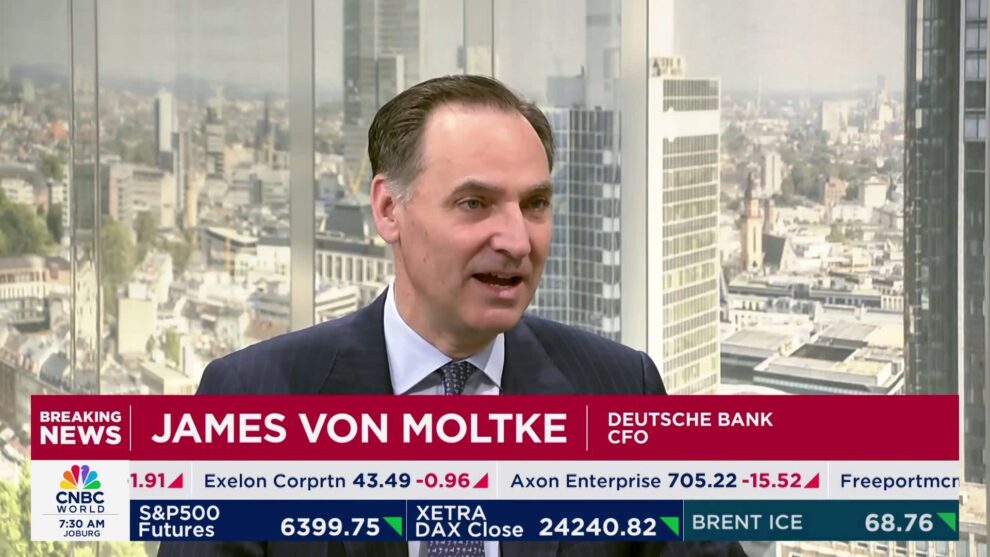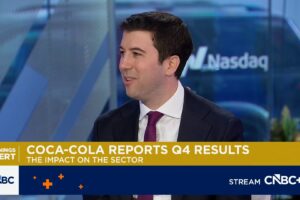Illustration shows the logo of Deutsche Bank Brussels, Saturday 25 March 2023.
Nicolas Maeterlinck | Afp | Getty Images
Deutsche Bank on Thursday beat expectations on the bottom line and said it was on track to meet full-year targets, despite mixed results within its key investment banking unit and euro gains against the U.S. dollar.
Net profit attributable to shareholders reached 1.485 billion euros ($1.748 billion) in the second quarter, versus a 1.2 billion forecast from Reuters. It compares with a loss of 143 million euros in the June quarter of 2024, when earnings were hit by legal provisions linked to Deutsche Bank’s takeover of Postbank.
The lender’s revenues over the period came in at 7.804 billion euros, in line with a mean analyst forecast of 7.76 billion euros produced by LSEG.

Deutsche Bank Chief Financial Officer James von Moltke told CNBC’s Annette Weisbach in a Thursday interview: “The setup in terms of momentum, discipline around costs, momentum in the businesses, looks to us very encouraging, and therefore we’re confident that we’re on track to achieve our targets.”
Across the board, the bank noted an impact from the relative strength of the euro against the U.S. dollar, with von Moltke describing it as the “big thing that’s kind of flowing through our numbers.”
Deutsche Bank shares were jumped over 9% as of 2:45 p.m. London time (9:45 a.m. E.T.).
Other second-quarter highlights included:
- Profit before tax of 2.4 billion euros, up 34% year-on-year, excluding the impact of the Postbank litigation.
- CET 1 capital ratio, a measure of bank solvency, was 14.2%, compared with 13.8% in the March quarter.
- Post-tax return on tangible equity (ROTE) rate of 10.1%, from 11.9% in the previous quarter.
The firm’s core investment banking unit reported a 3% year-on-year uptick in revenue to 2.7 billion euros in the June quarter, but reported mixed results at its subdivisions.
In fixed income and currencies, the bank posted a “strong” 11% revenue bump driven by higher net interest income in financing and increased volatility and client activity in foreign exchange. But Deutsche Bank’s origination and advisory division — which deals with relationships with major corporates and sovereign institutions — logged a second-quarter revenue decline of 29% to 416 million euros, citing “market uncertainty” and noting an overall “postponement of some material transactions into the second half of 2025.”
Corporate banking revenues, meanwhile, dipped by 1% on the year to 1.896 billion euros in the second quarter, with von Moltke noting “a bit of a chill” in corporate activity and decision-making.
“Loan growth has been more sluggish than we’d like to have seen,” he said, flagging the effect of foreign exchange translations from the parts of the business accounted in the U.S. dollar. “Otherwise, as I say, it’s been a normalization of deposit margins, a little bit of effects. That’s … held the business back in the quarter.”

Euro/dollar
European banks overall are facing the challenge of navigating a lower interest rate environment, with the European Central Bank most recently bringing its key interest rate down to 2% in June and expected to hold that monetary policy during its meeting later in the Thursday session.
A recent German and broader European defense spending push has been supporting gains within the industry and offering new investment opportunities for European lenders. Speaking to CNBC’s Annette Weisbach in late June, Deutsche Bank CEO Christian Sewing said that “we have clearly, in particular on the European side, been underinvesting” and stressed the lender has sized up both its portfolio appetite and resourcing to advise clients on defense ventures.
Domestically, the tumult that gripped German politics at the end of last year has quietened after snap elections awarded stewardship to a new ruling coalition under Chancellor Friedrich Merz. The renewed stability has been reflected in investor and client sentiment and is also beginning to reverberate in business volumes, according to von Moltke.
“That’s a real change from the past several years that where that hasn’t been the case,” he said.
But the European Union’s largest economy — and the third largest exporter globally — is now mired in trade uncertainty as the 27-nation bloc races to agree a tariff deal with U.S. President Donald Trump by an Aug. 1 deadline.
“If tariffs materialise in August, a recession in Germany in 2025 cannot be ruled out,” Bundesbank President Joachim Nagel said last week, according to Reuters.
Von Moltke likewise recognized that U.S. tariffs could pose a “relatively steep” increase in currency translations and an ultimate “headwind” for European exporters, but said the impact will be “very varied” for each corporate business.











